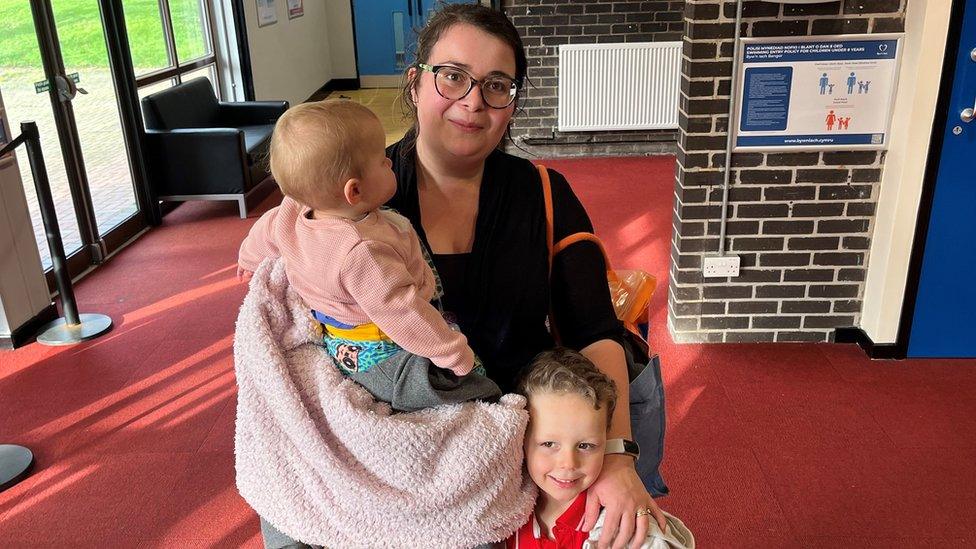Vulnerable hit most by cuts, MSs tell Welsh government
- Published

Amid concerns about childcare help, Martha Thomas says working and paying nursery costs is "really hard"
Vulnerable people could be worst hit by planned cuts to the Welsh government budget, say Welsh Parliament members.
Protecting frontline services will come "at the expense of long-term measures to reduce poverty", said a committee of Members of the Senedd (MSs).
The Welsh government announced £600m budget cuts in December to protect the NHS and train firm Transport for Wales.
The Welsh government said it would publish a final budget this month amid "incredibly difficult" decisions.
The report added that the proposed spending and taxation plans meant it was unlikely that the money given to local authorities and social care providers would be enough to keep services at an acceptable level.
It said it committee members were "concerned that there seems to be no plan in place to monitor the effect" of the extra spending on the NHS and Transport for Wales.
The proposed boost in spending for the NHS "without the equivalent increase for the social care sector" was a worry, it added, because increasing demand on social care without more funding could create "knock-on pressures" for the health service.

Caryl Owen says receiving childcare help "made a massive difference to us"
Plaid Cymru committee chair Peredur Owen Griffiths said: "We recognise the difficult financial position faced by the Welsh government, but we are concerned about their claims that this budget will protect frontline services in Wales.
"Decisions to not extend free school meals and to cut the spending on childcare is also cause for concern and something which will disproportionately impact the most vulnerable in Wales.
"We're urging the Welsh government to look again at these decisions."
The committee said it was "unconvinced" by the administration's explanations on its decisions on free school meals and childcare.
Parents and guardians of three and four-year-old children in Wales can claim up to 30 hours of free childcare each week, for up to 48 weeks of the year, provided they meet certain criteria.
In Bangor, Gwynedd, several working parents described the importance of the Welsh government's childcare offer to reduce the squeeze on family finances.
Caryl Owen, from Anglesey, said since her son had recently turned three they received the 30 free hours a week, which had "made a massive difference to us".
She added: "Before, it was hundreds of pounds a month extra childcare. But we are lucky we've got family as well that look after him two days a week so he was in childcare three days - but it's still hundreds of pounds".

Nathan McCarthy's son turns two next week "so it's another year of paying an arm and a leg" for childcare
Nathan McCarthy, from Anglesey, described the cost of childcare for his one-year-old son as "massive".
"Our childcare is more than our mortgage," he said.
"But luckily my mum takes him once a week but he goes to a childminder four days a week - it costs an absolute fortune.
"He's two next week so it's another year of paying an arm and a leg."
Martha Thomas, from Pontllyfni, near Caernarfon, said: "It's really hard, but luckily I've got local childcare. I've got spaces for both these kids to meet my work needs, so they go full-time to the local nursery.
"But it is hard, the balance: having to go to work full-time and also pay for nursery costs as well as pay for general life needs."
In December officials said they hoped they could reduce costs in several areas - including free school meals, apprenticeships, childcare and further education - because of less than expected demand or because less money was needed.
However the committee argued that extending the eligibility for free school meals to secondary school pupils was an "important part of tackling the long-term problems of poverty" and would only be a "relatively modest cost".
Members are calling on Finance Minister Rebecca Evans to "look again at whether the scheme could be extended".
In addition, it called the £11m cut to childcare provision a "cause for concern" and urged ministers to "assess the current scheme's effectiveness and ensure the childcare system allows and encourages the full-time employment of parents".
Mr Griffiths said the committee had been "very disappointed" with the "lack of time to scrutinise the effects of some of the Welsh government's spending decisions on those most affected".
He said that "this has hampered our ability to engage with these industries to discover what this cut will mean to businesses across Wales".
The Welsh government said: "This is the starkest and most painful financial situation faced since the start of devolution.
"We have been clear going into our draft budget preparations that, because our budget is now worth £1.3bn less in real terms than when it was set in 2021, incredibly difficult decisions have had to be taken."
It said it would consider the findings of this other scrutiny committees before publishing a final budget on 27 February.

THE ELY ESTATE: Jason Mohammad and the reality of life in Ely
UNDER MILK WOODS: Listen to the dramatic portraits of five different areas of Wales

- Published9 August 2023

- Published4 October 2023

- Published31 August 2023
